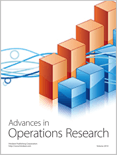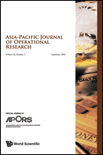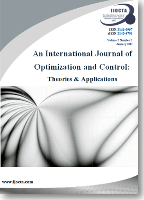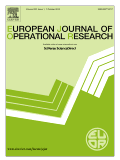
CYBERNETICS AND SYSTEMS ANALYSIS
Scope & Guideline
Pioneering Research in Cybernetics for Tomorrow's Solutions
Introduction
Aims and Scopes
- Cybernetic Systems Modeling:
Research in this area involves the development and application of mathematical models to simulate and analyze complex systems. This includes dynamic systems, feedback control mechanisms, and adaptive algorithms. - Optimization Techniques:
The journal publishes studies on optimization methods applicable to various systems, including stochastic optimization, multi-criteria decision-making, and resource allocation problems. - Artificial Intelligence and Machine Learning:
Recent contributions explore the integration of AI and machine learning techniques in modeling complex systems, enhancing predictive capabilities, and improving decision support systems. - Signal Processing and Communications:
This includes advancements in filtering techniques, noise reduction, and data transmission methods, particularly in the context of radar signals and communication systems. - Mathematical Methods in Economics and Management:
Research often focuses on mathematical modeling and analysis of economic systems, including optimization of capital investments, inventory control, and supply chain management. - Fractional Calculus and Differential Equations:
Studies involving fractional differential equations and their applications in various fields, such as physics, engineering, and economics, are a significant area of interest. - Decision-Making Under Uncertainty:
This includes methodologies for making informed decisions in uncertain environments, leveraging statistical and computational techniques to evaluate risks and outcomes.
Trending and Emerging
- Interdisciplinary Approaches:
There is a growing trend towards integrating insights from various disciplines, such as computer science, economics, and social sciences, to address complex system challenges. - Advanced AI Applications:
The application of artificial intelligence and machine learning in modeling and decision-making processes is on the rise, with increasing interest in neural networks and deep learning techniques. - Complex Systems and Network Analysis:
Research focusing on the analysis of complex systems and networks, including their dynamics and interactions, is gaining traction, reflecting contemporary challenges in systems analysis. - Sustainability and Environmental Modeling:
Emerging themes include the modeling of environmental systems and the impact of climate change, showcasing a shift towards sustainability in systems analysis. - Cybersecurity and Information Systems:
With the increasing importance of cybersecurity, there is a notable trend towards research that addresses the security of information systems and the development of robust algorithms for anomaly detection. - Real-Time Data Processing:
The emphasis on real-time data analytics and processing techniques is growing, driven by advancements in sensor technology and the Internet of Things (IoT), making timely decision-making more feasible.
Declining or Waning
- Classical Optimization Methods:
Traditional optimization techniques, which were once a focal point, are being overshadowed by more advanced computational and heuristic methods. This shift reflects a growing preference for approaches that handle complex, non-linear systems. - Basic Statistical Methods:
There has been a noticeable reduction in the focus on foundational statistical analysis techniques, as researchers increasingly adopt more sophisticated models that incorporate machine learning and AI. - Deterministic Models:
The reliance on deterministic models is waning in favor of stochastic and adaptive models that better accommodate the uncertainties inherent in real-world systems. - Single-Domain Applications:
Research that focuses solely on specific domains (e.g., economics or engineering) is becoming less common, with an increasing trend towards interdisciplinary approaches that combine insights from multiple fields.
Similar Journals

Vestnik Udmurtskogo Universiteta-Matematika Mekhanika Kompyuternye Nauki
Bridging disciplines for a smarter future.Vestnik Udmurtskogo Universiteta-Matematika Mekhanika Kompyuternye Nauki is a distinguished academic journal published by Udmurt State University, based in the Russian Federation. Catering to an interdisciplinary audience, this journal spans fields such as computer science, mathematics, and fluid dynamics, with a focus on disseminating innovative research findings that contribute to the theoretical and applied aspects of these domains. As an Open Access journal, it provides researchers, professionals, and students with an unrestricted opportunity to access high-quality scientific content, promoting the exchange of knowledge and fostering collaboration. With categories ranked in the third quartile (Q3) in areas such as General Mathematics and Fluid Flow and Transfer Processes, the journal is vital for those looking to stay abreast of evolving methodologies and applications in these rapidly advancing fields. The unique positioning of this journal, serving as a platform for scholarly articles, further emphasizes its importance as a valuable resource for advancing academic discourse and research development up to the year 2024 and beyond.

International Journal of Applied Mathematics and Computer Science
Unlocking Potential in Applied Sciences and EngineeringThe International Journal of Applied Mathematics and Computer Science is a premier open-access journal published by SCIENDO, dedicated to advancing knowledge in the interdisciplinary fields of applied mathematics, computer science, and engineering. Since its inception in 2001, the journal has continually provided a platform for researchers to publish high-quality, peer-reviewed articles, contributing significantly to its fields, as evidenced by its strong Q2 quartile rankings in 2023 across key disciplines. With a notable impact factor and ranking within the Scopus database—#135 in Applied Mathematics and #45 in Computer Science—the journal emphasizes innovative research and practical applications. Open access since 2014, it has aimed to foster collaboration and ensure that vital scientific knowledge is accessible to a broader audience, positioning itself as an essential resource for researchers, professionals, and students seeking to stay on the cutting edge of technological and mathematical advancements.

Advances in Operations Research
Exploring the Future of Management ScienceAdvances in Operations Research, published by HINDAWI LTD, is a prominent peer-reviewed journal dedicated to the field of operations research, with a particular emphasis on innovative methodologies and applications that drive efficiency and performance across various industries. Established as an Open Access journal since 2009, it aims to provide unrestricted dissemination of research findings, thereby fostering accessibility and collaboration within the academic community. With an ISSN of 1687-9147 and E-ISSN of 1687-9155, the journal covers a broad spectrum of topics relevant to management science and operations research, and has been recognized for its contributions with a Q3 quartile ranking in its category for 2023. As of now, the journal is indexed in Scopus, ranking #131 out of 207 in the decision sciences category, placing it in the 36th percentile. The journal's commitment to advancing knowledge in operations research makes it an invaluable resource for researchers, professionals, and students seeking to explore cutting-edge theories and practices. For further insights and to access the latest research articles, please visit the journal’s website.

ASIA-PACIFIC JOURNAL OF OPERATIONAL RESEARCH
Exploring the Frontiers of Operational ResearchASIA-PACIFIC JOURNAL OF OPERATIONAL RESEARCH is a premier academic publication dedicated to the dynamic fields of operational research and management science, published by WORLD SCIENTIFIC PUBL CO PTE LTD. Located in Singapore, this journal has been pivotal in contributing to the dialogue and development of innovative strategies and methodologies within the operational research community since its inception in 1991. With a focus on practical applications and theoretical advancements, it serves as an essential resource for researchers, practitioners, and students seeking to enhance their understanding and expertise in decision sciences. The journal has gained recognition with a Q3 ranking in Management Science and Operations Research in the 2023 category quartiles, underlining its significance in the academic landscape. The Scopus ranking positions it reasonably well, attracting contributions that address both contemporary and emerging challenges in the field. Although the journal operates under a traditional publishing model, it offers vital access to a wealth of high-quality research, making it a go-to source for key findings and methodologies in operational research. Through its rigorous peer-review process, the journal aims to foster collaborative efforts that advance knowledge and practice across the Asia-Pacific region and beyond.

JAPAN JOURNAL OF INDUSTRIAL AND APPLIED MATHEMATICS
Advancing Innovation in Applied MathematicsThe Japan Journal of Industrial and Applied Mathematics, published by Springer Japan KK, is a pivotal platform for disseminating cutting-edge research in the fields of applied mathematics and engineering. With an ISSN of 0916-7005 and an E-ISSN of 1868-937X, this journal has been a cornerstone in the academic community since its inception in 1991 and will continue to contribute pivotal insights through 2024. Positioned in the Q3 category for both Applied Mathematics and Miscellaneous Engineering according to 2023 rankings, it is recognized for its diverse range of topics and interdisciplinary approaches. Despite its competitive ranking, the journal fosters valuable contributions that challenge conventional methodologies and inspire innovation. Researchers, professionals, and students alike will find the journal’s contents invaluable for advancing knowledge and exploring new methodologies in industrial and applied mathematics.

Radio Electronics Computer Science Control
Shaping the Future of Control Systems Through Interdisciplinary DialogueRadio Electronics Computer Science Control is a distinguished academic journal published by the ZAPORIZHZHYA NATIONAL TECHNICAL UNIVERSITY that has been committed to advancing the fields of radio electronics, computer science, and control systems since its inception in 1999. With an open access model, the journal ensures that high-quality research is freely available to a global audience, fostering collaboration and innovation among researchers, professionals, and students alike. While the current impact factor is not listed, the journal remains an essential resource for those seeking to explore cutting-edge developments in technology and engineering, contributing significantly to the interdisciplinary dialogue among scholars in these domains. The journal publishes original research articles, reviews, and case studies, making it a vital platform for disseminating knowledge and advancing scientific understanding in the rapidly evolving landscape of computer and control systems. Located in Zaporizhzhya, Ukraine, the journal serves as a beacon of scholarly communication in Eastern Europe and beyond.

INTERNATIONAL JOURNAL OF INDUSTRIAL ENGINEERING-THEORY APPLICATIONS AND PRACTICE
Fostering collaboration in the dynamic field of industrial engineering.INTERNATIONAL JOURNAL OF INDUSTRIAL ENGINEERING - THEORY APPLICATIONS AND PRACTICE is a pivotal academic resource dedicated to advancing the field of Industrial Engineering. Published by the esteemed University of Cincinnati, this journal, bearing the ISSN 1072-4761 and E-ISSN 1943-670X, has been an influential platform since its inception in 1994, highlighting innovative research, theoretical advancements, and practical applications in industrial engineering. Positioned within the Q3 category in Industrial and Manufacturing Engineering, this journal aims to disseminate knowledge and foster collaboration among researchers, professionals, and students across the globe. Despite not being open access, the journal promotes impactful scholarship with its work being rigorously peer-reviewed, ensuring high-quality publications that contribute significantly to the field. By exploring diverse topics that intersect theory and practical solutions, the journal effectively caters to the growing demand for knowledge in this specialized area, making it a vital resource for anyone looking to stay ahead in industrial engineering and related disciplines.

International Journal of Optimization and Control-Theories & Applications-IJOCTA
Unlocking Potential Through Innovative Theories and Applications.International Journal of Optimization and Control-Theories & Applications (IJOCTA), published by Ramazan Yaman, stands as a pivotal platform in the fields of applied mathematics and control optimization. With an ISSN of 2146-0957 and an E-ISSN of 2146-5703, IJOCTA has embraced an Open Access model since 2011, ensuring that its scholarly contributions are widely accessible to researchers, professionals, and students alike. Based in Turkey at the Istanbul Atlas University, the journal is committed to advancing the scope of optimization and control theories, featuring comprehensive studies that bridge theoretical foundations with practical applications. Despite its relatively recent surge, IJOCTA has achieved impressive standings, including a Q3 quartile ranking in both Applied Mathematics and Control and Optimization for 2023, alongside commendable Scopus rankings (Rank #192 in Applied Mathematics and Rank #44 in Control and Optimization). These metrics underscore the journal’s growing significance and impact within the global research community, making it an invaluable resource for those seeking to explore contemporary developments in optimization and control.

EUROPEAN JOURNAL OF OPERATIONAL RESEARCH
Elevating Standards in Operational Research and SimulationThe EUROPEAN JOURNAL OF OPERATIONAL RESEARCH, published by Elsevier, is a prestigious academic journal that has been at the forefront of research in the fields of operations research, management science, and industrial engineering since its inception in 1977. With an impressive impact factor and holding a Q1 ranking in several related quartiles for 2023—including Computer Science, Management Science, and Modeling and Simulation—this journal serves as a critical platform for disseminating innovative methodologies and applications in various domains. Researchers and practitioners alike benefit from its rigorous peer-reviewed articles, which encompass diverse topics such as optimization techniques, decision-making processes, and simulation models. Although the journal currently does not offer open access, it continues to attract a broad readership from academia and industry, making significant contributions to the advancement of operational research. The EUROPEAN JOURNAL OF OPERATIONAL RESEARCH remains essential for anyone looking to stay abreast of cutting-edge developments in operational theory and practice.

Operational Research
Exploring the Nexus of Theory and Practice.Operational Research is a premier academic journal published by Springer Heidelberg, focusing on the intersection of advanced computational theory, management science, and operations research. With an ISSN of 1109-2858 and an E-ISSN of 1866-1505, this respected journal serves as a key platform for the dissemination of high-quality research that enhances the understanding and application of quantitative methods across various fields, including technology management, simulation modeling, and statistical analysis. With its impressive performance evidenced by a Q2 ranking in multiple categories such as Computational Theory and Mathematics and Management Science, Operational Research occupies a critical role in the knowledge landscape, reflecting its 88th percentile ranking in decision sciences and numerical analysis per Scopus metrics. While currently not open access, it continues to facilitate the advancement of its disciplines through rigorous peer-review, with a commitment to publishing relevant, impactful studies from 2009 through to 2024. Researchers, professionals, and students alike will find this journal an invaluable resource for staying abreast of significant advancements in operational research methodologies and applications.